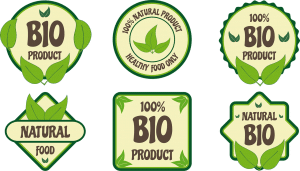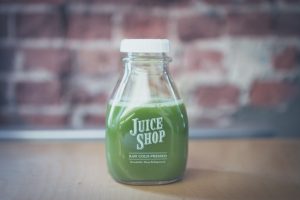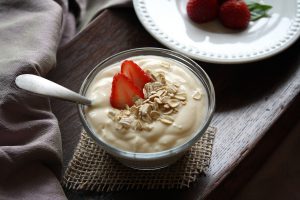Marketers are generally pretty good at their jobs. They can get us to believe all sorts of claims about products, and influence our purchasing decisions in all sorts of ways. It seems like this is especially true when it comes to food: companies know that nowadays most people at least claim to be looking for healthier options when they hit the grocery store. In fact, according to recent research, 43% of people say they “always” look for healthy options, and 52% say they “sometimes” do.
Not only that, but food manufacturers and marketers know that a lot of shoppers (a full 49% in this study) look at health claims on food packages when making their decisions about buying something. So, packaged foods will often be advertised with words such as “healthy,” “real” and “contains vegetables” to make them sound more nutritious than they really are. But what’s the real scoop on some of the foods in your pantry? Are they really better-for-you options, or are they just cleverly marketed?
It’s All in the Marketing
Research from the National Institutes of Health shows that adding health claims to front labels makes people believe a product is healthier than the same product that doesn’t list health claims, but these claims can often be misleading. Just think about a product like Cocoa Puffs cereal – sure, the box proudly proclaims that they’re made with “whole grains,” but does that mean that a sugary bowl of them is actually good for you? Of course not! So before we move on to some more products with dubious health claims, let’s take a look at some sneaky packaging claims:

- Natural – Aw, poor “natural”: this positive word has been so overused nowadays that it has become almost meaningless. At this point, it usually just means that the manufacturer worked with a natural source, like apples or rice.
- Organic – Organic whole foods, like fruit and veggies, can be great options if you’re worried about the use of pesticides, but remember that the word “organic” is not synonymous with “healthy” when it comes to packaged, processed foods. After all, organic sugar is still sugar!
- No added sugar – Speaking of sugar, this is a pretty sneaky one: some packages claim that a product has no “added” sugar, but that could still mean that the product is naturally high in sugar, or that it contains some questionable artificial sweeteners.
- Low-fat – Be careful with a product claiming it’s “low-fat”: the manufacturer might have added extra sugar to retain flavor.
- Low-calorie – Did you know that when something is marketed as “low-calorie” it usually just means that the product has one-third fewer calories than the same brand’s original product? That means one brand’s low-calorie version may have similar calories as another brand’s original.
- Multigrain – This just means that the product contains more than one type of grain, but it’s not necessarily made with whole grains.
- Made with whole grains – Check out the clever wording on this one! Foods with this claim could actually contain very little whole grains, so check the ingredients list. If whole grains aren’t in the first three ingredients, the amount is negligible.
- Fruit-flavored – Being “naturally” fruit-flavored doesn’t mean a product contains fruit: it could just contain chemicals designed to taste like fruit.
Foods That Might Not Pass the Health Test
There’s some seriously sneaky wordplay going on with a lot of food packaging. Some things that you’d think might be a pretty solid option might actually be things that you really should steer clear of (or at least limit as a treat). So let’s take a look at some well-marketed processed foods that are more hype than health:

Granola
What’s “crunchier” than granola, right? This breakfast food has a long history of being pushed as a healthy option, but its reputation as a health food isn’t exactly well-earned. Many of the granolas at your local supermarket are made using butter, vegetable oil, and white sugar, and can contain at least 9 grams of sugar and upwards of 400 calories per serving without milk. You’d be better served by seeking out a low-sugar option – or better yet, try a muesli that’s made with actual whole grains, nuts, and unsweetened dried fruit.
Veggie Sticks
We’re not talking cut up actual veggies here – we’re talking about those crunchy, potato-based, salty snacks that call themselves veggie sticks (or veggie straws). These snacks are cleverly marketed to parents hoping to get at least some veggies into their kiddos, making claims on the packaging such as “made with spinach,” “now with sweet potato” and “100% all natural.” Some brands even claim that their veggie sticks have the same nutritional content as 2 cups of broccoli or 2 carrots. But the truth is that veggie sticks and straws lack fiber and protein, and are practically devoid of nutrients, not to mention loaded with salt. You’d definitely be better off dipping real veggie sticks in hummus!
Baked Chips
When it comes to baked chips, marketers are betting on the fact that a lot of people are still stuck in the old-school, 1990s “low-fat is always better” way of thinking. But while regular fried potato chips aren’t exactly a health food, the baked versions are highly processed, loaded with salt, and often so low in fat that you can consume large quantities without ever feeling full. Not only that, but they often still have the same number of calories as full-fat chips! They can also increase blood sugar and cause an insulin surge, which can actually promote fat storage in your body.
Gluten-Free Bread
After a lot of clever marketing, a lot of people now equate “gluten-free” with “healthier.” In fact, according to a survey of more than 1,500 U.S. adults, 38% said they eat gluten-free foods because they believe they’re better for their overall health. But studies show that most gluten-free foods contain more fat and salt, and less fiber, protein and vitamins, than their gluten-containing counterparts. A dense, whole-grain sprouted bread made from fiber-rich, wholesome ingredients is a much healthier choice than a gluten-free bread made from fiber-free cornstarch, tapioca, and rice flour.
Veggie Burgers
This might seem like a controversial one, but you have to be really careful when purchasing packaged veggie burgers (as opposed to making some delicious, whole-food-based ones yourself!). You might be trying to cut down on your red meat consumption, and adding more veggies into your diet (and we’re all for that!), but you could end up with a highly processed product that contains 20 or more ingredients, including non-nutritive cornstarch, thickeners such as methyl cellulose, and wheat gluten, a cheap protein substitute. This is one type of product where you simply cannot choose based on front-of-package marketing. They might be “natural” or “vegan,” but they might not be exactly what you were going for when you decided to swap out your beef for veggies, so check the labels.
“Healthy” or “Green” Juices

You know what? Juice is juice, no matter what healthy whole food it started out as. Even if it’s a green juice, it’s still packed with sugar from the other juices added, and it is totally lacking in fiber (unlike a homemade smoothie), so it won’t give you many nutritional benefits, or fill you up.
Trail Mix Bars
A handful of nuts and unsweetened dried fruit is a great snack! But when food manufacturers step in and try to turn that healthy snack into an easy treat for on-the-go, it usually ends in healthy nuts and raisins being glued together with something sticky and sweet, which adds two or three teaspoons of sugar to your once-natural trail mix.
Turkey Bacon
Again, just because turkey bacon is lower in fat than pork bacon doesn’t necessarily make it any better for you. It’s often loaded with artificial colors, sodium, saturated fat, and nitrates, which studies are suggesting is carcinogenic. If you are going to eat any bacon, at least go for a nitrate-free option.
Yogurt
We’re not talking plain, natural yogurt – we’re talking those cute little cups of flavored yogurt. Sure, they might still have gut-healthy probiotics, but they’re also loaded with sugar and artificial flavors – even the ones that claim to be lower in sugar often have questionable artificial sweeteners. And don’t get us started on those dessert-like treat yogurts that come with things like cookie pieces or pretzels to add in. In most cases, they’re worse for you than some good old-fashioned, all natural ice cream!
Nobody’s saying you have to cut out all snacks and treats, but when you’re making your everyday choices, you should be aware of how food manufacturers are often trying to make their processed foods seem healthier than they actually are. That means reading labels carefully, and not relying on vague claims made on packages – or even better, making whole foods the basis of your diet. After all, the bottom line is that packaged, processed foods, even if they started out as something whole and “real” are probably not going to be as good for you as whole foods. Let us know how important information on food packages is to you, and what information you rely on when choosing the products you buy!
